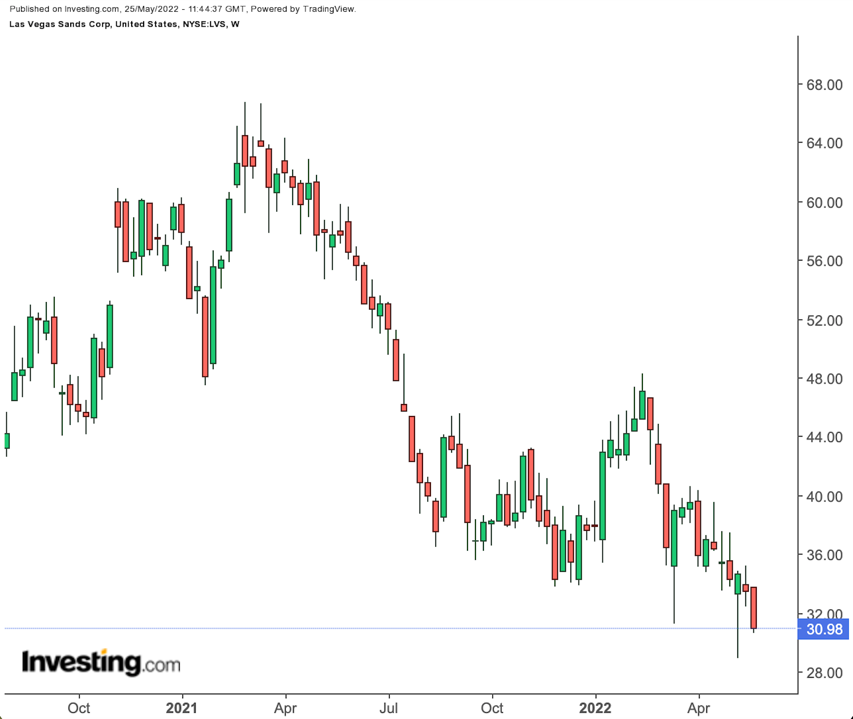This article was written exclusively for Investing.com
For most publicly traded leisure companies, normalcy is returning after the worldwide novel coronavirus pandemic. But that hasn't been the case for Las Vegas Sands (NYSE:LVS), the global developer of integrated resorts which include gaming, entertainment, and retail malls.
As most of the world opens up, China continues to enact significant restrictions on travel, including to the enclave of Macau where LVS has several major properties. At the moment, there seems little change in that policy; so-called “COVID zero” efforts have kept the major city of Shanghai on lockdown for weeks.
In that environment, Las Vegas Sands' operating results unsurprisingly have taken an enormous hit. Recovery is likely several quarters, if not several years, away.
But that alone doesn't mean LVS can't rally. In fact, there's a good argument that it will. The question is when.
LVS Stock Takes A Beating
At the end of 2019, LVS stock traded at $70. It closed Tuesday barely above $30.
Given the nature of the company's fundamentals, there's an argument the decline could be worse. In 2019, Las Vegas Sands generated $4.9 billion in Adjusted Property EBITDA (earnings before interest, taxes, depreciation, and amortization) on the back of nearly $12 billion in revenue. (Both figures exclude the contribution that year from a property in Pennsylvania, divested during 2019, and the company's operations in Las Vegas, which were sold in a deal that closed in February.)
In 2021, revenue was more than 60% lower. Adjusted Property EBITDA was less than $800 million—down over 80%. Given that performance, an investor could argue that the 57% decline in LVS since the end of 2019 isn't enough, rather than too much.
A Distant Recovery—And Other Risks
Meanwhile, it's not as if the news is getting any better. In the first quarter of this year, revenue was 21% lower than in the year prior. Adjusted Property EBITDA dropped by more than half. Compare the numbers to Q1 2019 (again excluding the US operations) and the news is even worse: revenue off 69%, Adjusted Property EBITDA down more than 90%.
Shanghai should exit lockdown next month, at least based on the current trajectory of cases in the city. But restrictions will continue across China, which hits the properties in Macau as well as Marina Bay Sands in Singapore.
COVID isn't the only concern. In China (which generated about two-thirds of pro forma profit in 2019), Sands must get a license from the central government. The company originally did so through a so-called “sub-concession” in 2022; that agreement expires next month.
On its first-quarter conference call, Sands said that it expected its license would be extended, with final details on a new license to be firmed up in the second half of the year. But with President Biden saber-rattling with China over Taiwan, long-running worries have resurfaced. Bears have long argued that Sands (and rival Wynn Resorts (NASDAQ:WYNN)) could become geopolitical pawns should US-China relations deteriorate.
That's one reason why LVS and WYNN shares sold off during the height of the “trade war” during the Trump presidency. Further tensions could provide more bad news when Sands needs it least.
Taking The Long View
All told, there are significant worries at the moment. And even with LVS just off an 11-year low, touched earlier this month, it seems likely too early to try and time the bottom here. There's little sign that the operating environment is going to improve any time soon. Nor is there any evidence that equity investors are looking to take on these kinds of risks at the moment.
That said, taking the long view, LVS stock does look at least intriguing. The company faces pressure for sure—but it has options to reduce its reliance on China. Backed by the cash raised through the sale of the Vegas operations, Sands is looking at the potentially lucrative New York City market. A resort in Thailand is another possibility.
In China and Singapore, meanwhile, normalcy will return at some point, and then so will gamblers. Most US casinos in fact posted record results in 2021, in part because of pent-up demand. At some point in the future, Las Vegas Sands' properties in Macau and Singapore will see the same benefit.
Yes, the outlook appears dark now—but few analysts were recommending American gaming stocks in March or April of 2020. The sector was one of the best-performing in the entire market over the next 18 months.
And if normalcy does return, at some point LVS stock will look awfully cheap. The company currently has an enterprise value (market cap plus net debt) of about $31 billion. That's less than 8x 2019 Adjusted Property EBITDA from Asia, even adjusted for the company's 70% ownership of its Macau operations. (Sands' China subsidiary, Sands China (HK:1928), is listed on the Hong Kong Stock Exchange.)
Before the pandemic, LVS usually traded at 12x-15x on that basis before the pandemic. Assume the company can recapture even the low end of that range and the stock nearly doubles—even without any value added from new developments, or the roughly $1 billion being invested to improve and expand the Singapore property.
Those returns aren't guaranteed. At the very least, they will require patience. But, until recently, investors had that patience. When the market again starts taking the long view, LVS stock should find a rally.
Disclaimer: As of this writing, Vince Martin has no positions in any securities mentioned.
***
The current market makes it harder than ever to make the right decisions. Think about the challenges:
- Inflation
- Geopolitical turmoil
- Disruptive technologies
- Interest rate hikes
To handle them, you need good data, effective tools to sort through the data, and insights into what it all means. You need to take emotion out of investing and focus on the fundamentals.
For that, there’s InvestingPro+, with all the professional data and tools you need to make better investing decisions. Learn More »
